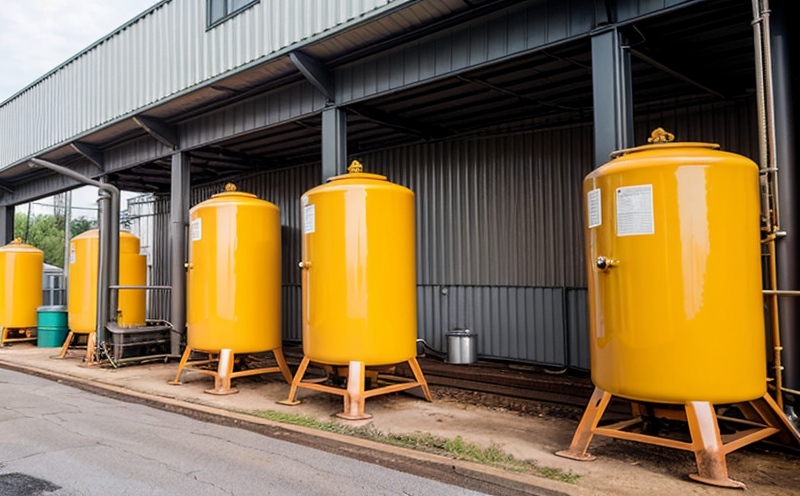ASTM A370 Mechanical Properties Compliance Testing of Steels
The ASTM A370 standard is a cornerstone in the mechanical testing of steels, ensuring that materials meet the stringent requirements set by industry standards. This test evaluates critical mechanical properties such as tensile strength, yield strength, elongation, and reduction of area, which are essential for quality assurance and regulatory compliance.
During ASTM A370 testing, a specimen is subjected to a controlled tensile load until it fractures. The data collected from this process provides insights into the material's mechanical integrity under stress conditions. This test is particularly important in sectors like aerospace, automotive, and construction where safety and performance are paramount.
The ASTM A370 standard covers several types of specimens including round bars, flat samples, and seamless or welded pipes. The choice of specimen type depends on the specific application requirements and the part size. Specimen preparation is critical; it involves precise machining to ensure that the surface finish, dimensions, and geometry are within specified tolerances.
The testing apparatus used for ASTM A370 includes a universal testing machine equipped with appropriate grips and fixtures capable of applying controlled loads to the specimens. The machine must be calibrated regularly to maintain accuracy. Strain gauges or extensometers may also be used to measure elongation accurately during the test.
The acceptance criteria for ASTM A370 are strictly defined in the standard. Tensile properties like yield strength and tensile strength should not deviate from specified limits. Elongation is measured as a percentage of original length after fracture, and it indicates ductility which is crucial for predicting material behavior under stress.
ASTM A370 testing plays a vital role in ensuring that materials used in critical applications meet the required performance standards. It helps manufacturers verify that their products are safe and reliable before deployment. For instance, in aerospace manufacturing, ASTM A370 ensures that fasteners can withstand the high stresses encountered during flight.
In automotive manufacturing, this test confirms that structural components like axles or suspension parts have adequate strength to handle dynamic loads without failure. In construction, it guarantees that beams and columns used in buildings are robust enough to support heavy structures and resist environmental degradation.
- Aerospace: Ensuring fasteners can withstand high stresses during flight.
- Automotive: Confirming structural components like axles or suspension parts have adequate strength.
- Construction: Guaranteeing beams and columns used in buildings are robust enough to support heavy structures.
Industry Applications
The ASTM A370 mechanical properties compliance testing is widely utilized across various industries, including aerospace, automotive manufacturing, construction, and energy. In the aerospace sector, this test ensures that fasteners used in aircraft structures can withstand extreme conditions without failure.
In automotive manufacturing, it confirms that structural components like axles or suspension parts have adequate strength to handle dynamic loads during operation. For construction projects, ASTM A370 testing guarantees that beams and columns used in buildings are robust enough to support heavy structures and resist environmental factors such as temperature fluctuations and corrosion.
In the energy sector, materials for pipelines and pressure vessels must meet stringent mechanical property requirements to ensure safety and durability under operational conditions. ASTM A370 helps verify these properties, ensuring that materials perform reliably in harsh environments.
Why Choose This Test
Choosing ASTM A370 mechanical properties compliance testing offers several advantages for manufacturers and quality managers. Firstly, it provides a comprehensive evaluation of the mechanical integrity of steel materials, ensuring that they meet critical performance standards.
This test is essential in industries where safety and reliability are paramount, such as aerospace, automotive, and construction. By adhering to ASTM A370, manufacturers can demonstrate compliance with international standards, which enhances their reputation and marketability.
The precision of this testing method allows for consistent quality control, reducing the risk of product defects that could lead to costly recalls or failures in use. Additionally, it supports continuous improvement initiatives by providing data-driven insights into material performance under stress conditions.
Environmental and Sustainability Contributions
The ASTM A370 mechanical properties compliance testing contributes significantly to environmental sustainability efforts. By ensuring that steel materials are robust enough for critical applications, this test helps prevent product failures that could lead to accidents or waste.
In industries like aerospace and automotive, where lightweight yet strong components are crucial for reducing fuel consumption and emissions, ASTM A370 testing ensures the reliability of these parts. This reduces the risk of premature failure, which would otherwise result in increased resource consumption and environmental impact.
For construction projects, ensuring that beams and columns used can withstand stress without failing helps extend the lifecycle of structures. Longer-lasting buildings mean less frequent replacements, reducing the demand for new materials and lowering overall carbon footprints associated with manufacturing processes.





